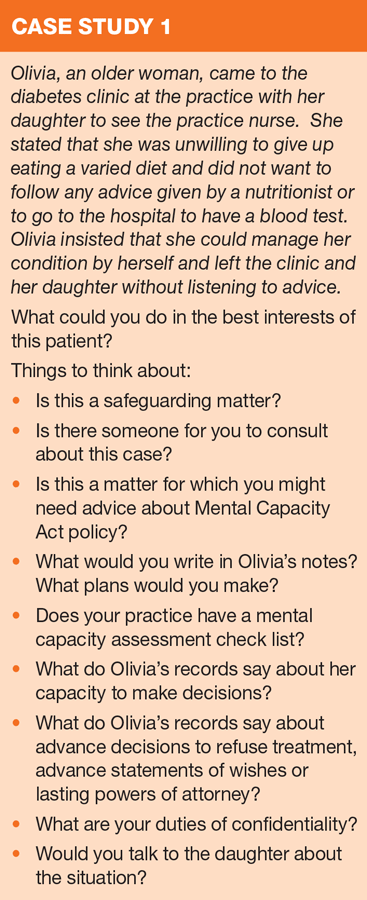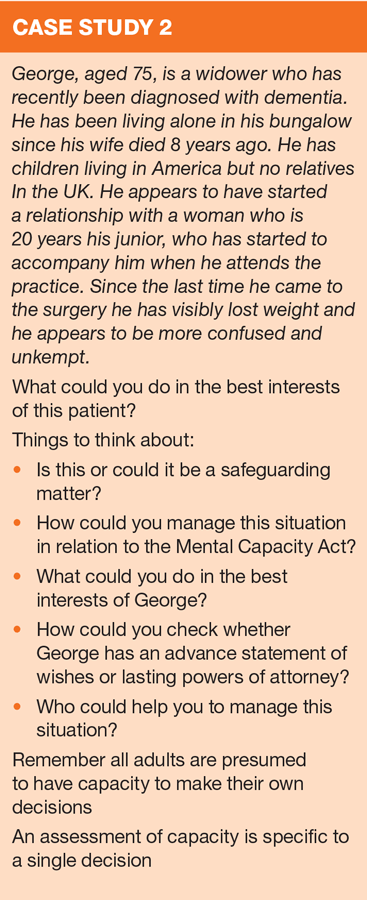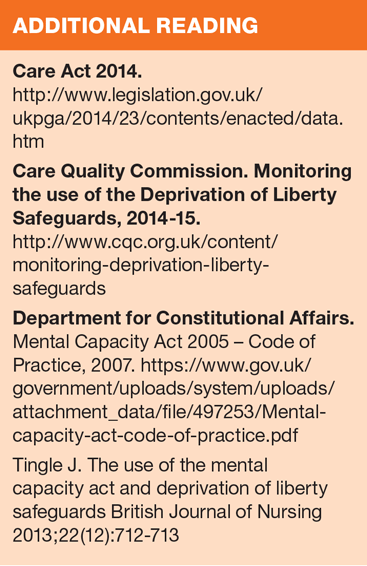Safeguarding adults:an update on legal principles
Julie Dalphinis
Julie Dalphinis
Designated Adult Safeguarding Manager,
City and Hackney CCG; Safeguarding lead, Inner London CCGs
The principles that underpin effective safeguarding practices are set out in legislation, and it is important to incorporate them into day-to-day practice. This article will look at the safeguarding aspects of the Care Act, the Mental Capacity Act, and also discuss the implications of the Deprivation of Liberty safeguards.
THE CARE ACT
The Care Act 2014 defines safeguarding and puts a duty on key agencies to work in partnership to protect the physical, mental and emotional well being of all persons who need safeguarding. It seeks to ensure that safeguarding procedures emphasise personal control when plans are being made for the protection of people who are not able to protect themselves. This is called the ‘making safeguarding personal’ approach. Five key aspects of this approach are:
- Being person-centred and ensuring that the wishes of the person have been achieved
- Arranging, if appropriate, for an advocate to represent and support an individual who is subject to a safeguarding enquiry or review
- Cooperating with relevant partners in order to protect the adult while enhancing involvement choice and control
- Ensuring that risk has been addressed and a difference has been made
- Being outcome-focused rather than process-driven
The Care Act states that it is a professional duty to raise what is called a section 42 enquiry if the three following aspects can be applied:
- The person has needs for care and support – and this applies even if those care needs are not presently being met
- The person is experiencing or is at risk of abuse or neglect
- The person is, as a result of those care and support needs, unable to protect themselves.
The Care Act changes the focus of safeguarding towards ensuring that practitioners can recognise different forms of abuse rather than identifying people as vulnerable. The different types of abuse outlined in the Act include:
- Physical abuse
- Domestic violence and or abuse
- Sexual abuse
- Psychological or emotional abuse
- Modern slavery
- Discriminatory abuse
- Organisational or institutional abuse
- Neglect or acts of omission
- Self neglect
Effective safeguarding arrangements help to ensure the safety of patients. It is important that someone in the practice takes a lead on safeguarding adults. Using a variety of sources such as the general practice toolkit, and the regional safeguarding board audit, it is possible to suggest some steps for all staff to ensure that safeguarding within a practice is robust.
1. All practice staff should be able to recognise abuse. This means that training in the practice needs to be up to date and frequent. It needs to be for everyone in the practice according to their job role and it needs to be put in place as soon as the employee starts in practice and repeated after three years. Any learning from situations that have been dealt with that the practice team has been involved in should be discussed and any changes needed should be implemented.
2. The practice needs leadership to recognise and prevent risks to the practice population. This means that any action that needs to be taken so that staff who exploit individuals are referred appropriately, and that patients should be able to raise concerns and make complaints. If a serious allegation is made against a member of the practice staff in regard to safeguarding it should be reported to the CCG. Safeguarding practice should be regularly audited and any suggested improvements implemented.
3. A safeguarding strategy and policy should be developed and updated. This will also need to include policies for addressing staff capacity and capability concerns and whistleblowing, as well as information for staff making safeguarding referrals.
4. A practice needs to follow good recruitment and staff management policies. This includes carrying out pre-employment checks for all team members and keeping these updated. It also includes making clear statements about safeguarding in job advertisements, seeking proof of identity and qualifications as well as proof that the employee has the right to work in the UK. The policy should include the use of mobile devices and the Internet by employees in regard to safeguarding.
5. A practice needs to provide supervision for staff members. This gives them the chance to discuss safeguarding cases, situations and practice including the safe use of social networking sites.
6. Practices should share relevant information for safeguarding appropriately according to legal and local guidelines. It is good practice to have a patient information leaflet about safeguarding.
THE MENTAL CAPACITY ACT
Capacity is vitally important in health care, and practices need to be aware of the ways that the Mental Capacity Act affects safeguarding practice. The Act came into force in 2005, and the Deprivation of Liberty safeguards (DoLs) were added in 2007. These two acts are hugely important because they were designed as a legal framework to support people to make decisions themselves where it is possible, and for decisions to be made in a person’s best interests where it is not.
It is fundamentally important that all adults have the right to make their own decisions. Under the law everyone is presumed to have the capacity to make their own decisions and it is up to a health care professional to prove otherwise if they have the grounds to believe that this is not the case. Needless to say this process must be documented clearly.
The Act assumes the right of all individuals to make decisions and protects those who may lack the ability to make decisions. It includes five principles:
- Firstly that capacity must be assumed
- Individuals should make their own decisions
- Individuals have the right to make unwise decisions
- If an individual lacks capacity then a decision can be made in his or her best interests
- Such a decision must be the least restrictive available.
General practice nurses, who may see people in domestic situations or be asked for health advice about people who are resident in a care home, need to be aware that capacity must be assessed using a two-stage test. The first stage of a capacity test is a diagnostic tool to determine whether there is an impairment or disturbance in the functioning of the brain. The second is a functional test to establish whether an individual has the capacity to make a decision. The idea of capacity was described by the Department of Constitutional affairs in 2007 as being time and decision specific and satisfying four criteria:
- The ability to understand information
- To retain it long enough to make a decision
- The ability to weigh up the information, and
- The ability to communicate it.
Where a person lacks friends and family an independent mental capacity advocate must be allocated to provide an impartial decision.
Tingle et al identified poor understanding of the Mental Capacity Act and deprivation of liberty safeguards (DoLs) as well as a significant shortfall in training highlighted regarding the mental capacity act.
The situation regarding DoLs was effectively extended after a supreme court ruling in March 2014, P v Cheshire West Council, and P & Q v Surrey County Council. The ruling stated that two people living in supported living were being deprived of their liberty. They lacked capacity to choose where they lived and were not free to leave the premises. Until this point, DoLs had only applied in care homes but after the ruling it was considered that it could be applied at home where the care was given largely by general practice.
The Act created the Court of Protection (in London), which can make decisions relating to the Mental Capacity Act. The Act provides for patients to have a right to refuse treatment should they lose capacity in the future. There is also provision for the Court of Protection to appoint deputies on behalf of people lacking capacity to take decisions on welfare, healthcare and financial matters.
Training in the Mental Capacity Act is mandatory for staff who see patients therapeutically, and for those that do home visits. General practice nurses – and other staff – should have a personal development plan for supervision, which incorporates difficult cases, in order to develop their confidence in dealing with Mental Capacity Act issues. It should also be borne in mind that the Act has a bearing on issues such as gaining consent for treatment. It allows for advanced decisions to be made about care and treatment. It is also important to note that the death of a person subject to a DoLs authorisation is legally classified as a death in state detention and must be reported to and investigated by a coroner under the Coroners and Justice act 2009. This may affect communications with families who wish to arrange a fairly quick burial, as is the case with some families who follow Judaism or Islam.
A practice will need to think about how its staff communicates with families in respect of the Mental Capacity Act. It will need to make sure that they are aware of any advanced decisions, such as a decision to refuse treatment or an advance statement of wishes, and who within the family group has lasting powers of attorney. This may affect who can be party to consultations and what part they can play.
The Mental Capacity Act allows all adults aged 18 or over to appoint an individual with lasting powers of attorney to make financial health and welfare decisions. These attorneys are under a duty to act in the incapacitated adult’s best interest.
Practice safeguarding leads need to ensure the following to make sure that they are compliant with the Act:
- There should be a section in the safeguarding policy covering the Mental Capacity Act and DoLs
- There should be specific training on the Mental Capacity Act and DoLs
- Guidance and training on care planning should incorporate information from the Mental Capacity Act on consent and the involvement of relatives.
- The two acts are included in any safeguarding audit activity
Practices have duty to know and protect the rights of those receiving care and treatments, especially those who are vulnerable because they are not able to make decisions on their own behalf, as compliance with the Act is part of providing good quality care services.


